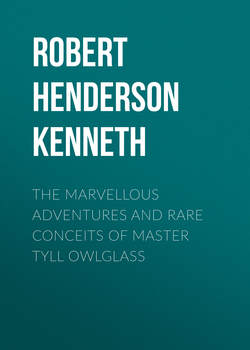Читать книгу The Marvellous Adventures and Rare Conceits of Master Tyll Owlglass - Robert Henderson Mackenzie Kenneth - Страница 13
The Eleventh Adventure
ОглавлениеHow Owlglass crept into a bee-hive, how two thieves came by night to steal honey, what honey they did steal, and how Owlglass made it to come to pass, that the thieves did fight one with the other, and did leave the bee-hive standing
Upon a time went Owlglass with his mother to the dedication of the church.9 And at the feast there he drank so much, did our good Owlglass, that he was tired, and he sought a place where he might lie down to sleep in peace. Then found he a yard where stood many bee-hives, and some were empty, and into one of these crept he privily and thought to sleep awhile; behold he slept from midday till midnight, and his mother thought surely that he had departed homeward again, as she nowhere could see him. That same night came two thieves and they had it in mind to steal a hive of honey, and they conferred together, in that they heard it said that the heaviest is also the best.
HOW OWLGLASS CATCHETH THE THIEVES.
Then did they lift up one after the other to see the which might be the most heavy, and at last came they to the one in which lay good master Owlglass; and it was the heaviest of all. Then spake the one to the other, saying: “Here is the best among the bee-hives.” So took they that one and carried it away, but wist not what good burden they bare. Good Master Owlglass, feeling the motion, thereupon awoke up, and heard what they said about stealing honey; and he rejoiced in himself to think what honey they had stolen. It was now so dark that ye could not see your hand before ye, an if ye even held it up to your eyes. Then put Owlglass his hand from out of the bee-hive, and caught hold of the foremost thief by the hair and pulled it until he roared. And the thief was very angry at the one who was behind, and thought it was he who had plucked him by the hair. Then spake the one who was behind him, saying: “Dost thou dream, or goest thou to sleep? How could I pluck thee by the hair? Hardly, is it possible for me to hold the bee-hive with both my hands.” Then laughed Owlglass within himself at what the thief said, and thought that the game would go better in a while after, and waited till they had got a fine distance further forward. Then put he out his hand again, and plucked the hindmost smartly by the hair; and the hindmost man became yet more angry and said: “Thou sayest I pluck thee by the hair and I bear the bee-hive till I break my neck, and now thou pluckest me by the hair thyself.” Then answered the foremost: “I pull thee by the hair? thou liest in thy throat. I cannot see my way before my face, and yet sayest thou: I pluck thine hair, quotha!” Thus with many revilings did they carry the hive along. And, as they were thus quarreling the one with the other in great choler and wrath, Owlglass plucked the foremost one by the hair again, and that so hard that he knocked his head against the hive. Thereat grew he angry, and let down the hive, and took his fellow by the head. That did also the other, and did manfully resist the blows of his comrade. Then fought they until they fell down in the dark and neither of them could behold the other, for the darkness continued very thick. Thus lost they their way and fled asunder with a great cry, and the bee-hive stood in the place where they had left it. Then Owlglass lay down again at ease to sleep until dawn; and when that it was light he thanked his stars that by this adventure it was shown him that he should see the world. And then gat he up from out of the bee-hive and did take a road, which lay before him, having a good heart that by his wit, wisdom, and knavery, he would live a merry and happy life in his time, and not die unhonoured of those that should come after him.
9
Feasts of the Dedication. These feasts, common in Germany, were also not uncommon, even to the present century, in parts of England. They were held in the churchyard on the anniversary of the day of the parish church being dedicated for divine service. See in Tom Brown’s School Days (p. 30), a recent eloquent country-book, for a mention of this as applying to Berkshire.
